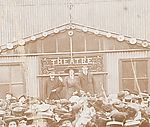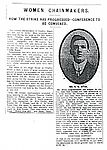 Thomas and Charles Sitch addressing a strike meeting
Thomas and Charles Sitch addressing a strike meeting Report on progress of the strike, Dudley Herald 3.9.1910
Report on progress of the strike, Dudley Herald 3.9.1910

As a member of the Chainmaking Trade Board, Charles Sitch played a central role in fixing minimum rates of pay for women chainmakers. When employers refused to pay the rate, Charles continued to fight their cause. He worked alongside local and national figures to make sure that the 1910 strike ended in success for the women chainmakers of Cradley Heath.
During the strike, Charles helped to organise and took part in the many meetings, rallies and marches. The photograph is just one of the scenes captured by Edwin Beech of Imperial Studios, Cradley Heath at the time of the strike. It shows a crowd gathered outside the corrugated iron "Empire Theatre", where several of the meetings took place. The Theatre was lent by Mr Morton, who also promised to give a benefit performance for the strikers. Charles is on the right of the platform. To the left is Thomas Sitch, his father and Secretary of the Chainmakers' and Strikers' Association. We believe the woman in the centre to be Julia Varley, Secretary of the Birmingham branch of the National Federation of Women Workers. Although not seen in this photograph, Mary Macarthur, the founder of the National Federation, was also at the meeting.
The newspaper cutting is an extract from a longer report of the meeting. In his speech to the crowd, Charles said that, "he had never seen such enthusiasm and determination displayed as on the present occasion." He went on to say that the employers were in favour of peaceful persuasion. His reply to the employers had been, "so was he, but not peace with slavery, and not peace at any price.He was in favour of peace when it was honest to the worker."
Throughout the strike Charles took part in the negotiations between the women's leaders and the Chain Manufacturers Association. As a result of the negotiations the Association agreed, "upon certain guarantees, to compel the middlemen in the trade to pay the recognised rates of pay, by refusing chain unless provided with a warranty stating that it was made by operatives earning rates allowed by the Trade Board."
Charles was also involved in fund raising, and worked alongside the twenty other people acknowledging donations and letters of support. He dealt with the stream of union and non-union members who came for advice to the "Strike Office" in High Street, Cradley Heath, and it is likely that he would have helped to organise the payment of strike pay.
It was Charles' commitment to the cause of the Cradley Heath women chainmakers, that laid the foundation for his reputation locally as a "man of the people".
Rollover the captions in the box to see the available images in thumbnail format, click the caption to see the full-size image
| Reference: | 643 |
| Keywords: | |
| Archive Ref: | 2004/034/001 |
| Updated: | Thu 26 Apr 2007 - 1 |
| Interpretation written by | Barbara Harris |
| Author's organisation | |
| Organisation's website |